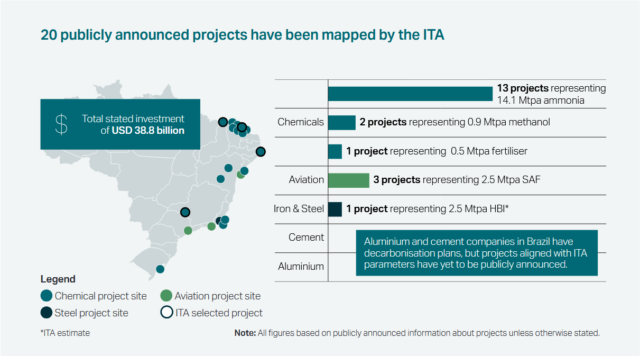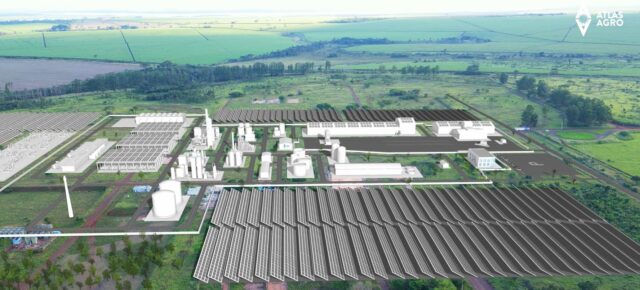Multi-stakeholder support to accelerate Brazil’s renewable industry
By Geofrey Njovu on January 16, 2025
Ambition to advance select projects to FID by this November, operations by 2030

Click to enlarge. The Industrial Transitions Accelerator has chosen Brazil as the first partner for its Project Support Programme, owing to a large pipeline of industrial decarbonisation projects. Source: ITA Insight Briefing.
At COP28 last year, stakeholders from policy, finance and industry joined up to form the Industrial Transition Accelerator (ITA). The initiative aims to use the collective expertise, resources and network of its members to propel industrial decarbonisation projects towards FID and scale, with seven key sectors at the core: cement, concrete, chemicals, steel, aviation, shipping and trucking. The ITA mission will be executed as part of the Mission Possible Partnership, an ambitious community of carbon-intensive industries, financiers and consumers that launched a global strategy for net-zero ammonia back in 2022.
One way in which the initiative plans to execute its mission is through the Project Support Programme, the goal of which is to “increase the number of low- and near-zero emissions industrial projects reaching FID in the country”. In the first iteration of this programme, the ITA inked a partnership with Brazil’s Ministry of Development, Industry, Trade and Services (MDIC) in October 2024. In Brazil, five sectors including chemicals, aviation, steel, cement and aluminium will take centre stage. The programme aims to advance select projects to FID by COP30 (which will be under the Brazil presidency), and to ‘operational status’ by 2030.
Project Portfolio

Click to learn more. Graphic visualisation Atlas Agro’s planned renewable fertilizer plant in Uberaba, Brazil. Source: Atlas Agro.
To date, four projects in the renewable ammonia, methanol and fertilizer sectors have been selected as part of this Programme. The projects (some of which will be familiar to readers at Ammonia Energy) are chosen following a four-part criterion: relevance to the seven core-sectors, commercial scale, decarbonisation potential and breakthrough technology.
- low-carbon fertilizer (Atlas Argo): this integrated renewable ammonium nitrate facility in Uberaba has a projected total investment of $1.16 billion. The project will produce renewable hydrogen, ammonia and nitrogen fertilizers powered by wind and solar energy from Brazil’s national grid. Atlas is targeting FID in early 2029.
- e-methanol (European Energy): Located in the Suape Industrial and Port Complex, this will be a 100, 000 tonnes-per-year renewable hydrogen-based e-methanol production plant, with an investment of about$344 million. Operations are projected for Q2 2028. The state government of Pernambuco signed the agreement with European Energy.
- renewable hydrogen & ammonia (Fortescue): The project aims to develop an integrated renewable hydrogen and ammonia production facility at the Port of Pecém. With FID expected this year, the facility will produce about 900,000 tons of ammonia from 168,000 tons of renewable hydrogen. Total investment is valued at$4 billion.
- renewable ammonia (Green Energy Park): Development of a renewable ammonia production and export facility located in the State of Piauí with an annual capacity of 2.1 million tons per year in the first phase. The project will require an investment of$4.5 billion. The produced hydrogen will be used domestically in green steel production and for exports to Europe and other markets. So far, long-term rights to port terminal facilities have been secured. FID is expected in 2026, with phased construction set to commence in 2028 through to 2035.
According to the ITA’s insight briefing, projects in the Programme will be supported through three main enablers: the development of local policies that are compatible with ‘green’ industry; local & export market creation & long-term offtake facilitation; and project preparation for investment & prospective investor engagement.
Our focus is on supporting companies in Brazil by establishing markets for their low-carbon products, informing public policy development, and linking them with financiers. We aim to support progress of the most advanced projects to final investment decisions within the next two years, while creating better conditions for new green industrial projects to be announced as well.
Faustine Delasalle, ITA Executive Director, in her organisation’s official press release, 12 December 2024
The development of the green hydrogen industry is a fundamental pillar for Brazil’s neoindustrialization. At Fortescue, we believe the country has significant competitive advantages to position itself in the global race. The progress of this industry and our Pecém Project can contribute to laying the foundation for a new production structure that will span sectors such as mining, green steel, e-fuels, and fertilizers.
Luis Viga, Country Manager of Brazil for Fortescue, in the ITA’s official press release, 12 December 2024
We are excited to work with the ITA to accelerate our transformative green hydrogen projects in Brazil. COP 30, in 2025, is the perfect venue to showcase the implementation of a Giga-Watt-scale energy transition project leveraging the unique and natural advantages for producing green hydrogen available in the North-East of Brazil.
Bart Biebuyck, CEO of Green Energy Park, in the ITA’s official press release, 12 December 2024
Fuella & Yamna: renewable ammonia announcements in Brazil
Not part of the ITA Programme but still in the Brazilian renewable ammonia space, the state government of Ceará and Norwegian developer Fuella AS have signed a pre-contract for the development of a 400,000 tons per year renewable hydrogen industrial plant (H2V) in the Export Processing Zone (ZPE) of the Port of Pecém.
The project will require an estimated $1.5billion in investment and is expected to generate upwards of 1000 jobs. Fuella is already building a similar plant in Bergen, Norway, supported by a grant award as part of the European Hydrogen Bank’s €720 million auction.
This pre-contract is very important and should, in two years, develop its projects and in three years build the plant for the large-scale production of green ammonia in Ceará…This is another important step towards consolidating Ceará as a world reference for the production of renewable energy, green hydrogen and green ammonia.
Elmano de Freitas, Ceará State Governor, in Complexodopecem’s official press release, 30 October 2024
Meanwhile, at the Port of Açu on Brazil’s southern coast, UK-based project developer Yamna has signed a land reservation agreement for a million ton per year renewable ammonia plant within the port complex. FID is due by 2027, and production of “its first green molecules” is due in 2030. The Port of Açu is a private enterprise owned by Prumo Logistics and the Port of Antwerp-Brugges. Fuella plans a smaller (400,000 tons per year) ammonia production project at the Port of Açu.